-
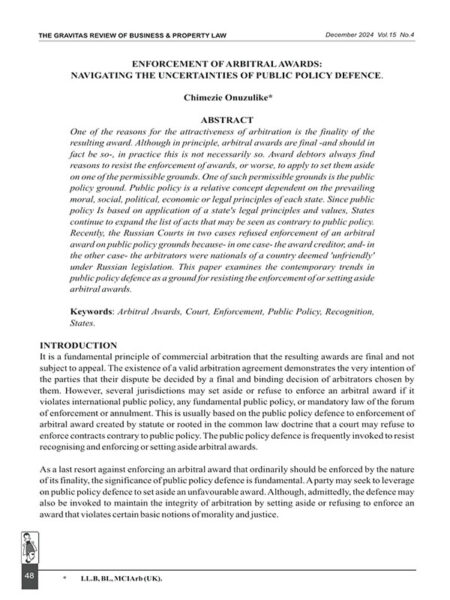
Enforcement of Arbitral Awards: Navigating the Uncertainties of Public Policy Defence
0₦2,500.00Chimezie Onuzulike in his article, Enforcement of Arbitral Awards: Navigating the Uncertainties of Public Policy Defence, examines the contemporary trends in public policy defence as a ground for resisting the enforcement of or setting aside arbitral awards. One of the reasons for the attractiveness of arbitration is the finality of the resulting award. Although in principle, arbitral awards are final -and should in fact be so-, in practice this is not necessarily so. Award debtors always find reasons to resist the enforcement of awards, or worse, to apply to set them aside on one of the permissible grounds. One of such permissible grounds is the public policy ground. Public policy is a relative concept dependent on the prevailing moral, social, political, economic or legal principles of each state. Since public policy Is based on application of a state’s legal principles and values, States continue to expand the list of acts that may be seen as contrary to public policy. Recently, the Russian Courts in two cases refused enforcement of an arbitral award on public policy grounds because- in one case- the award creditor, and- in the other case- the arbitrators were nationals of a country deemed ‘unfriendly’ under Russian legislation.
-
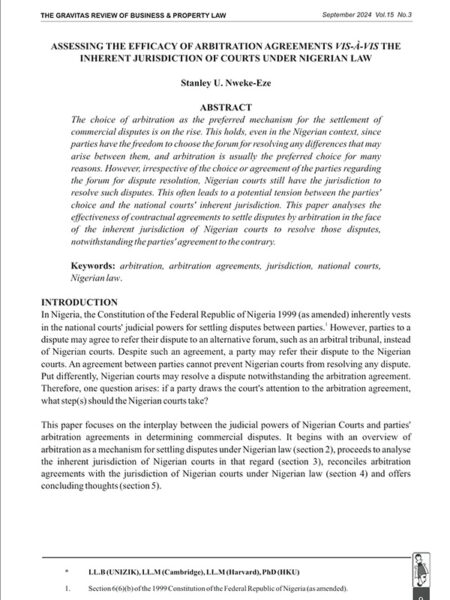
Situating the Efficacy of Arbitration Agreements Vis-à-Vis the Inherent Jurisdiction of National Courts under Nigerian Law
0₦2,500.00Stanley Nweke-Eze, in his article Situating the Efficacy of Arbitration Agreements Vis-à-Vis the Inherent Jurisdiction of National Courts under Nigerian Law, examines the efficacy of Arbitration agreements in the settlement of commercial disputes and the jurisdiction of national courts. The choice of arbitration as the preferred mechanism for the settlement of commercial disputes is on the rise. This holds true, even in the Nigerian context, since parties have the freedom to choose the forum for resolving any differences that may arise between them, and arbitration is usually the preferred choice for a myriad of reasons. However, irrespective of the choice or agreement of the parties regarding the forum for dispute resolution, a party may still invoke the inherent jurisdiction of the Nigerian courts to resolve such disputes. Oftentimes, this leads to a potential tension between the choice of the parties and the inherent jurisdiction of the national courts. Nweke-Eze analyses the effectiveness of contractual agreements to settle disputes by arbitration in the face of the inherent jurisdiction of Nigerian courts to resolve those disputes, notwithstanding the parties’ agreement to the contrary.
-
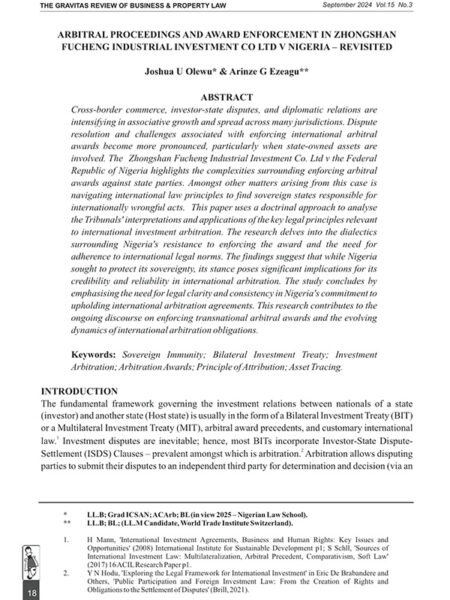
Arbitral Proceedings and Award Enforcement in Zhongshan Fucheng Industrial Investment Co Ltd v Nigeria – Revisited
0₦2,500.00Joshua Olewu and Arinze Ezeagu in their article, Arbitral Proceedings and Award Enforcement in Zhongshan Fucheng Industrial Investment Co Ltd v Nigeria – Revisited, examine jurisdictional issues arising from the enforcement of arbitral award in the celebrated case of Zhongshan Fucheng Industiral investment Co. Ltd v FRN. Cross-border commerce, investor-state disputes, and diplomatic relations are intensifying in associative growth and spread across many jurisdictions. Dispute resolution and challenges associated with enforcing international arbitral awards become more pronounced particularly when state-owned assets are involved. The case of Zhongshan Fucheng Industrial Investment Co. Ltd v Federal Republic of Nigeria highlights the complexities surrounding the enforcement of arbitral awards against state-parties. Amongst other matters arising from this case, is the navigation of international law principles to find sovereign states responsible for internationally wrongful acts. Using a doctrinal approach, Olewu and Ezeagu analyze the Tribunals’ interpretations and applications of the key legal principles relevant to international investment arbitration. The research delves into the dialectics surrounding Nigeria’s resistance to the enforcement of the award and the need for adherence to international legal norms. The findings suggest that while Nigeria sought to protect its sovereignty, its stance poses significant implications for its credibility and reliability in international arbitration. The study concludes by emphasizing the need for legal clarity and consistency in Nigeria’s commitment to upholding international arbitration agreements. This research contributes to the ongoing discourse on the enforcement of transnational arbitral awards and the evolving dynamics of international arbitration obligations.
-
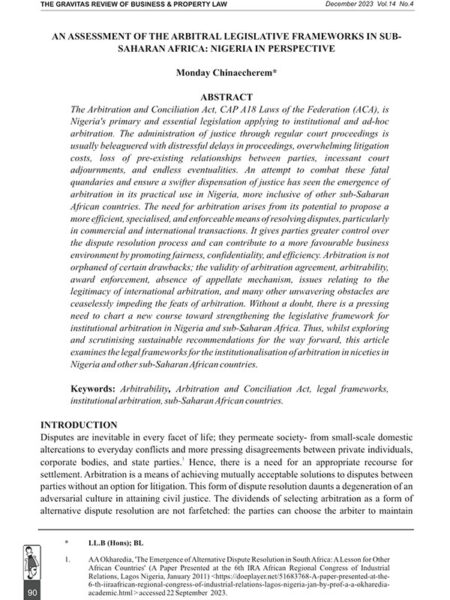
An Assessment of the Arbitral Legislative Frameworks in Sub-Saharan Africa: Nigeria in Perspective
0₦2,500.00Monday Chinaecherem, in his article, An Assessment of the Arbitral Legislative Frameworks in Sub-Saharan Africa: Nigeria in Perspective, undertakes an assessment of the legal framework for arbitral proceedings in sub-saharan Africa. He chronicles arbitral institutions in the region and extant legal reforms designed to increase the availability and choice of African destinations for commercial arbitration. He underscores a pressing need to chart a new course toward strengthening the legislative framework for institutional arbitration in Nigeria and sub-Saharan Africa. Chinaecherem whilst exploring and scrutinizing sustainable recommendations for the way forward examines in niceties, the legal frameworks for the institutionalization of arbitration in Nigeria and other sub-Saharan African countries.
-
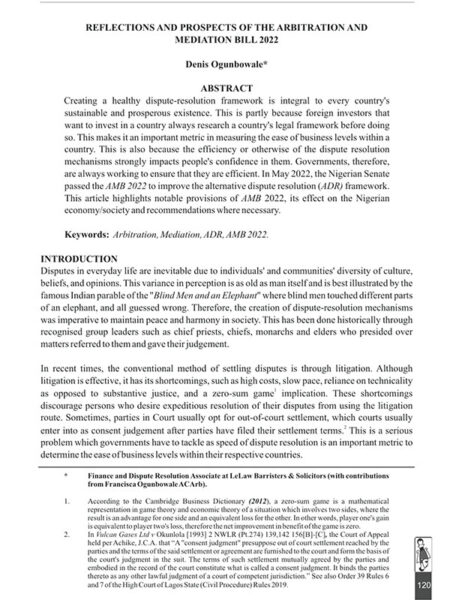
Reflections and Prospects of the Arbitration and Mediation Bill (AMB) 2022
0₦2,500.00Denis Ogunbowale of LeLaw Barristers & Solicitors reflects on the Arbitration and Mediation Bill, 2022, in his article, Reflections and Prospects of The Arbitration and Mediation Bill (AMB) 2022. He observes that creating a healthy dispute resolution framework is integral to every country’s sustainable and prosperous existence. He notes that the efficiency or otherwise of the dispute resolution mechanisms strongly impacts people’s confidence in them. In May 2022, the Nigerian Senate passed the AMB 2022 to improve the alternative dispute resolution (ADR) framework. Ogunbowale highlights notable provisions of AMB 2022, the likely effect on the ADR landscape, and the drawbacks of the Bill.
-
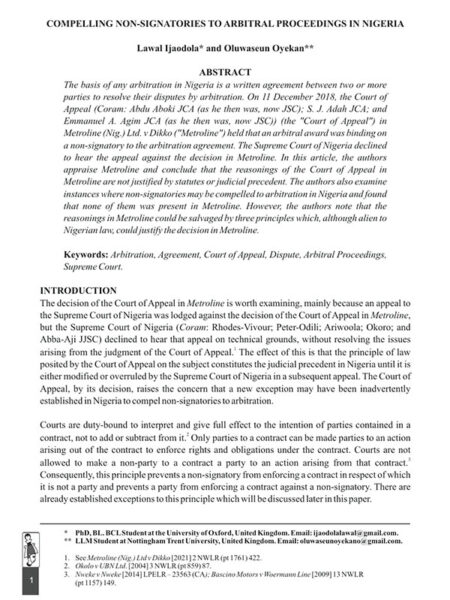
Compelling Non-Signatories to Arbitral Proceedings in Nigeria
0₦2,500.00Dr Lawal Ijaodola and Oluwaseun Oyekan, both formerly of G. Elias and now at the University of Oxford and Nottingham Trent University, United Kingdom, respectively, in their article, Compelling Non-Signatories to Arbitral Proceedings in Nigeria, note that the basis of any arbitration in Nigeria is a written agreement between two or more parties to resolve their disputes by arbitration. However, in the case of Metroline (Nig.) Ltd. v Dikko (Metroline), the Court of Appeal held that an arbitral award was binding on a non-signatory to the arbitration agreement. Dr Ijaodola and Oyekan appraise Metroline and conclude that the reasonings of the Court of Appeal are not justified by statutes or judicial precedent. They also examine instances where non-signatories may be compelled to arbitration in Nigeria and found none of them was present in Metroline. However, the authors note that the reasonings in Metroline could be salvaged by three principles which, although alien to Nigerian law, could justify the decision.
-
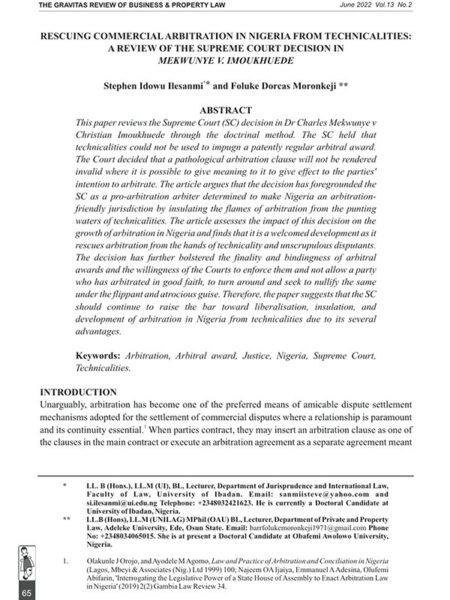
Rescuing Commercial Arbitration in Nigeria from Technicalities: A Review of the Supreme Court Decision in Mekwunye v Imoukhuede
0₦2,500.00Stephen Ilesanmi, Lecturer, University of Ibadan Nigeria and Foluke Moronkeji, Lecturer, Adeleke University Ede Nigeria, in their article, Rescuing Commercial Arbitration in Nigeria from Technicalities: A Review of the Supreme Court Decision in Mekwunye v Imoukhuede, review the Supreme Court’s (SC) decision in Mekwunye v Imoukhuede where the SC held that technicalities could not be used to impugn a patently regular arbitral award. The Court held that an arbitration clause would not be rendered invalid where it is possible to give meaning to it to give effect to the parties’ intention to arbitrate. Ilesanmi and Moronkeji argue that the SC decision has rescued arbitration from technicalities. They note that the decision has further bolstered the finality and bindingness of arbitral awards and the willingness of the Courts to enforce them and not allow a party who has arbitrated in good faith, to turn around and seek to nullify the same under flippant and atrocious guises.
-
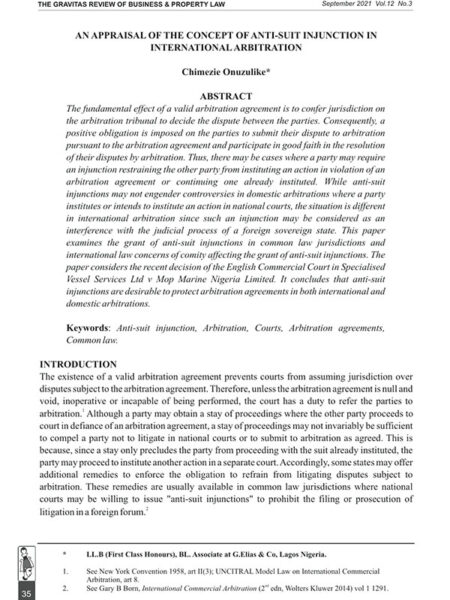
An Appraisal of the Concept of Anti-Suit Injunction in International Arbitration
0₦2,500.00Chimezie Onuzulike, Associate at G. Elias & Co, in his article, An Appraisal of the Concept of Anti-Suit Injunction in International Arbitration, explains that Anti-suit injunctions are orders of national courts usually granted in common law jurisdictions, restraining a party from commencing an action concerning a dispute subject to an arbitration agreement or continuing one already commenced in defiance of an arbitration agreement. He reviews the stance of courts in relation to the grant of anti-suit injunctions. He argues that while anti-suit injunctions may not engender controversies in domestic arbitrations where a party institutes or intends to institute an action in national courts, the situation is different in international arbitration since such an injunction may be considered as an interference with the judicial process of a foreign sovereign state. Chimezie reviews the decision of the English Court in Specialised Vessel Services Ltd v Mop Marine Nigeria Limited and stresses the importance of anti-suit injunctions in protecting arbitration agreements in both international and domestic arbitrations.
-
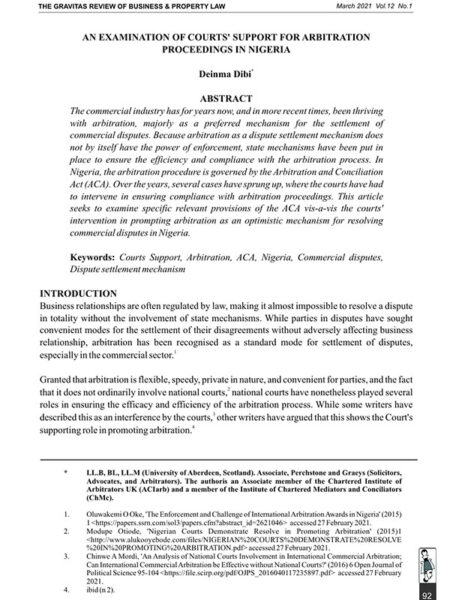
An Examination of Courts’ Support for Arbitration Proceedings in Nigeria
0₦2,500.00Deinma Dibi, Associate at Perchstone and Graeys in his article, An Examination of Courts’ Support for Arbitration Proceedings in Nigeria, examines the Arbitration and Conciliation Act, and decided cases to identify ways in which the courts in Nigeria support arbitral proceedings.
-
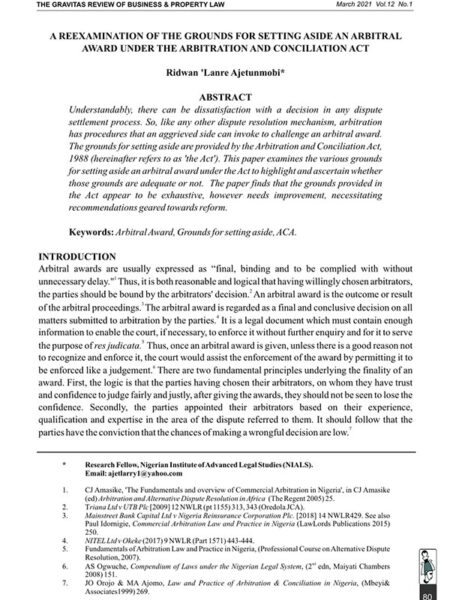
A Reexamination of the Grounds for Setting Aside an Arbitral Award Under the Arbitration and Conciliation Act
0₦2,500.00Ridwan Ajetunmobi, Research Fellow at the Nigerian Institute of Advanced Legal Studies, in his article, A Reexamination of the Grounds for Setting Aside an Arbitral Award Under the Arbitration and Conciliation Act, critically examines the various grounds for setting aside an arbitral award under the ACA. Ajetunmobi considers the adequacy of the grounds, the procedure for, and the legal effect of, setting aside an award. He proffers recommendations for further reform.
-
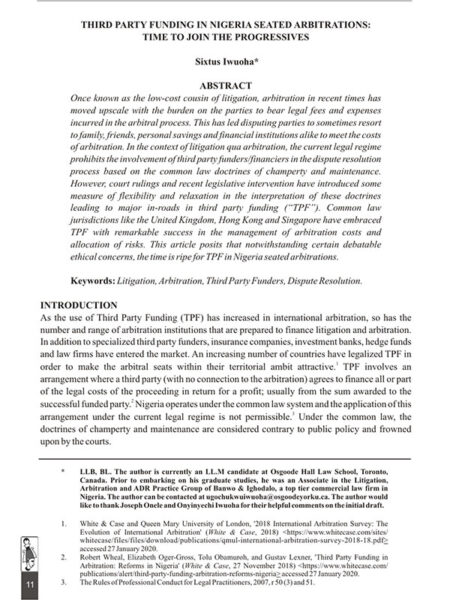
Third-Party Funding in Nigeria Seated Arbitrations: Time To Join The Progressives
0₦2,500.00Sixtus Iwuoha, formerly of Banwo & Igholado and now of the Osgoode Hall Law School, Toronto Canada, in his article, Third-Party Funding in Nigeria Seated Arbitrations: Time To Join The Progressives, posits that Arbitration, once known as the low-cost cousin of litigation, has moved upscale with a heavy burden on the parties to bear legal fees and expenses incurred in the arbitral process. This has led disputing parties to sometimes resort to family, friends, personal savings and financial institutions alike to meet the costs of arbitration. In the context of litigation qua arbitration, Nigeria’s current legal regime prohibits the involvement of third-party funders/financiers in the dispute resolution process based on the common law doctrines of champerty and maintenance. However, court rulings and recent legislative intervention have introduced some measure of flexibility and relaxation in the interpretation of these doctrines leading to major in-roads in third party funding TPF in jurisdictions like the United Kingdom, Hong Kong and Singapore. Sixtus concludes that notwithstanding certain debatable ethical concerns, the time is ripe for TPF in Nigeria seated arbitrations.
-
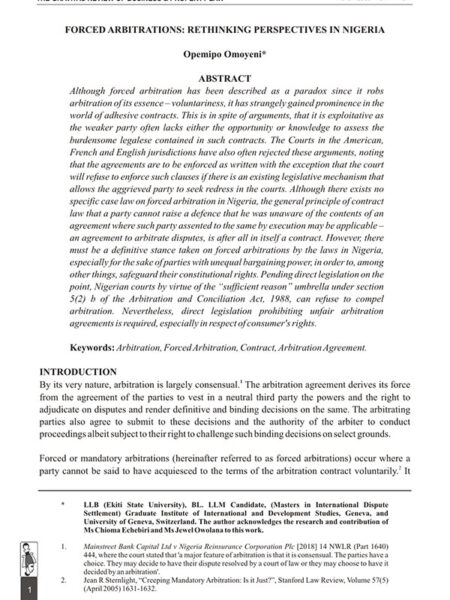
Forced Arbitrations: Rethinking Perspectives in Nigeria
0₦2,500.00Opemipo Omoyeni of the Graduate Institute of International and Development Studies Geneva Switzerland in his article, Forced Arbitrations: Rethinking Perspectives in Nigeria, considers the concept of Forced or Mandatory Arbitration which occurs mostly in standard form contracts where a party cannot be said to have acquiesced to the terms of the arbitration contract voluntarily. Omoyeni examines the state of the law in Nigeria, the United States of America, and the United Kingdom. Omoyeni posits that Forced Arbitration may work an injustice on the weaker party in an uneven bargaining position who is compelled to arbitrate his dispute while lacking the financial capacity or wherewithal to arbitrate, and who as well cannot be said to have given real consent to do so. He concludes with the need for legislation and the courts’ intervention to protect the weaker party.
The Gravitas Review of Business & Property Law



